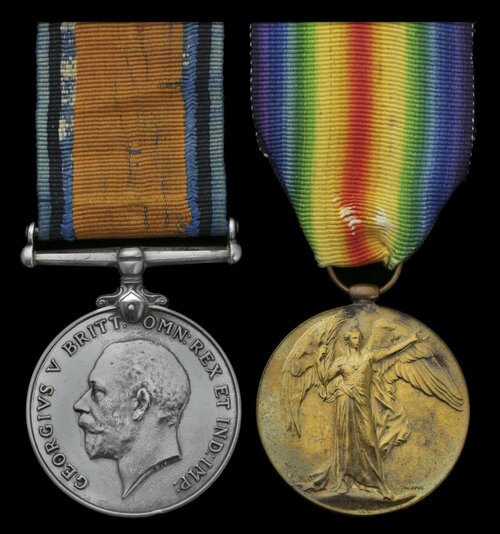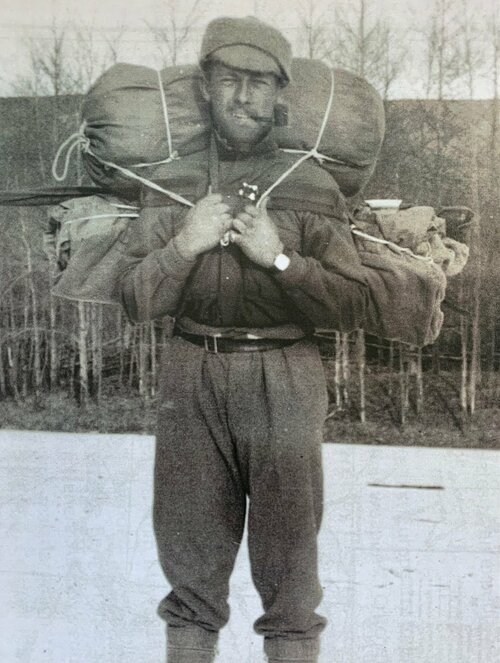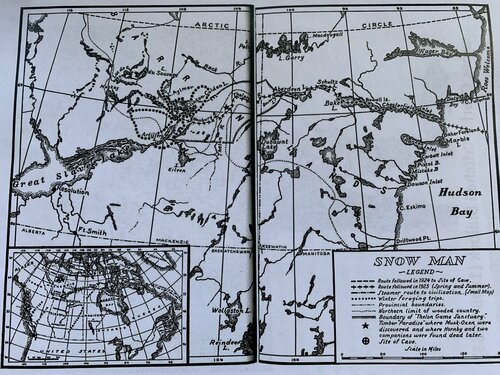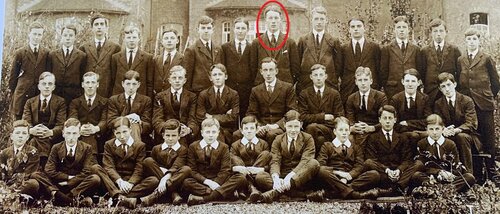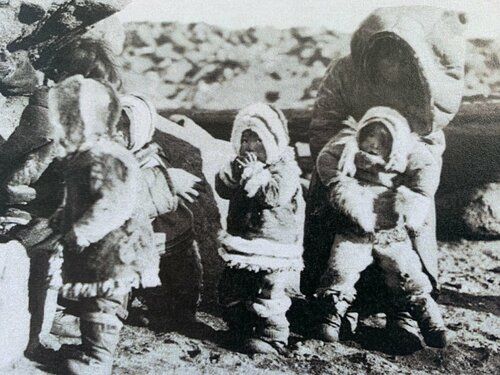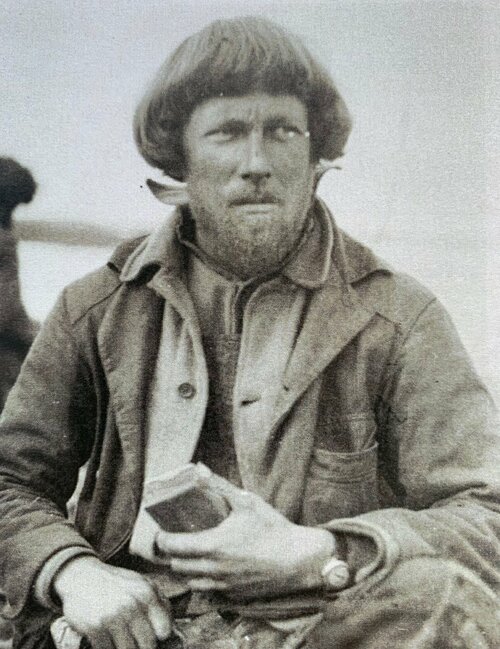Auction: 22001 - Orders, Decorations and Medals
Lot: 259
The interesting campaign pair awarded to Captain J. C. Critchell-Bullock, 18th Bengal Lancers, who served on the Western Front and with the Desert Mounted Corps - when he was the cameraman for General Allenby's triumphant entry into Aleppo
It was however for his exploration of North West Canada, along with Captain Jack Hornby, that Critchell-Bullock wrote his name into the history books - his little-known story should surely rank amongst the other heroes who explored other 'great unknowns'
British War and Victory Medals (Lieut. J. C. C. Bullock.), good very fine (2)
James Charles Critchell-Bullock was born in 1899, the son of James Taylor Bullock and Emily Kate Critchell. Educated at Sherborne College (Lyon House), he was commissioned into the Indian Army and served with the 18th Bengal Lancers, firstly in France and later in Palestine. Having first served in a dismounted capacity in the trenches, he served in the Desert Mounted Corps and had been the official cameraman for General Allenby's triumphant entry into Aleppo. It was whilst serving in Palestine that he contracted malaria, this put paid to his desire to gain a Regular Commission. His Medals were issued under the authority of the Government of India (Pair only).
In August 1923 he was forced to retire from the Army. It was a bitter anti-climax, for he had previously financed his life via a tust income which had been left to him by his grandfather, William Henry Bullock, so long as he remained a soldier. With but a few thousand pounds out of what was previously a life trust he travelled to Canada for a rest and a cure; what followed must have seemed like a nightmare but his story illustrates British grit on a parallel with the earlier explorers such as Scott, Henty and Ballantyne. Conflict with the elements provided him with his greatest challenges and possibly his greatest fulfilment.
He arrived in Edmonton where he contemplated his future, even the idea of joining the Mounted Police looked attractive. Sitting in the restaurant of the King Edward Hotel he chanced upon a scruffy fellow Englishman, Captain Jack Hornby. They immediately began a conversation which would see them spending a year together in the Barren Lands of Canada's North West. Critchell-Bullock was impressed with Hornby's stories and as the younger man probably saw a mentor in Hornby, in any event after a few days they began to make plans and settle on the provisions they would require. It would appear that Critchell-Bullock financed the trip wholly from his depleted savings.
Hornby was the son of the celebrated cricketer, Albert Neilson Hornby and was another lost soul seeking adventure. He was the veteran of one trying expedition in the North West and was looking to begin another. He had also served in France, initially with the Canadian Expeditionary Force as a Private before being commissioned into the South Lancashire Regiment, winning the Military Cross on the Somme.
Canada's Barren Lands - that rugged, desolate, heroically beautiful part of the Northwest Territories was one of the last great unexplored areas of North America. In 1923 Hornby and Critchell-Bullock set off on a year-long expedition to the Barrens, supported only by their wits and their weapons. Based on Bullock's diaries, Snow Man is the story of that journey and a testament to the strength of human character. We share in Hornby's and Bullock's sufferings and triumphs as they canoe and portage across the endless taiga, endure terrible hunger, and ultimately achieve their goal of being the first Europeans to live off the Barren's for an entire year.
Over the winter of 1926-27, Hornby starved to death on the Thelon along with two other men. They had planned to hunt migrating caribou, but failed to find the herd. Nevertheless, on the basis of Hornby's earlier explorations with Critchell-Bullock, the Thelon Game Sanctuary was established in 1927, renamed the Thelon Wildlife Sanctuary in 1956.
1928 saw Critchell-Bullock make a coast-to-coast drive across the United States giving lectures on the caribou and the musk ox and showing his films in any town that would hang up a white cloth screen and had a projector. In San Francisco running out of cash and ideas he accepted a commission-only position with the Press Syndicate of New York selling encyclopaedias door-to-door as the Great Depression hit.
He had committed to paper his adventures with Hornby in a draft book and had hitherto been unsuccessful in persuading any publishing houses. He eventually met a San Francisco journalist, Malcolm Waldron and between the two of them they re- wrote his adventures which were published in 1931 as Snow Man, John Hornby in the Barren Lands. Factual it was but it was also highly sensationalised and certainly didn't provide the riches that Critchell-Bullock craved from its publication. Shortly after he invested his remaining savings in a boat deal that turned sour and he lost all his money. He had hoped to purchase and sail the boat around Alaska and the MacKenzie River. Almost destitute he moved to Vancouver where he was employed by a gold mining company who employed him to take river tours up the Liard River. The company became insolvent and closed shortly afterwards Critchell-Bullock was again destitute and returned to England in 1932.
His fortunes changed dramatically on his return to England and with his contacts he collected several company Directorships with the corresponding income which enabled him to purchase a property in Belgravia. During the Second World War he became Director of Public Relations for the Red Cross. He married Daphne Cecilia Hickman on 7 June 1947.
Despite having achieved success at home he found living in post-War Britain with its austerity and food rationing too much. He hankered after adventure and so he moved his young family to Kenya shortly after the birth of his son, Mowbray. They arrived in Nairobi in May 1950 he no doubt full of optimism and with significant capital behind them to build a new life. He invested his capital in an asbestos mine which like his previous ventures failed. It was the time of the Mau Mau troubles and his timing was impeccable.
Facing financial ruin again he received a visit from his father in law, Major Charles Hickman, who concerned about his daughter and grandchildren's welfare must have suggested suicide as it appears his father in law gave him a loaded revolver.
On 30 March 1953 Critchell-Bullock booked himself into the Norfolk Hotel in Nairobi and took a room in the single storey resident's wing whereupon he wrote several letters including one to the hotel manager apologising for his actions. As recalled in print:
'Laying down his pen, Critchell-Bullock spread several thicknesses of newspaper across the bed. He bathed and dressed in crisp new pyjamas and a dressing gown. Then he lay down and carefully shot himself. It was 5am in Nairobi. The guest in the next room thought the sound was the backfiring of a car and went back to sleep.'
Critchell-Bullock was but 55 years of age.
His archive, which includes diaries, letters, photographs and films made during the expedition, were donated to Sherborne School by the recipient in 1950. Sold together with copies of Snowman, John Hornby in the Barren Lands, Malcolm Waldron, New York, Cold Burial, Clive Powell-Williams and Letters from the barren lands by J C C Bullock, edited by Carsten Iwers besides other research.
Subject to 20% VAT on Buyer’s Premium. For more information please view Terms and Conditions for Buyers.
Sold for
£700
Starting price
£600

